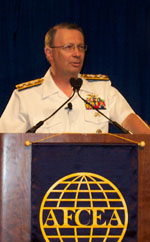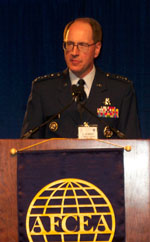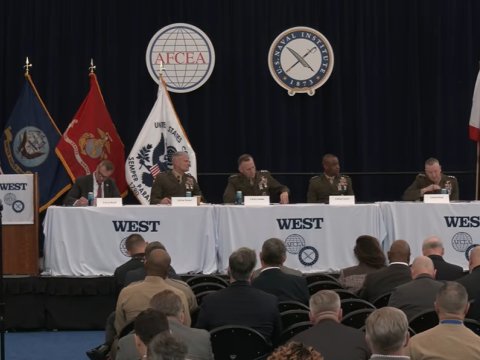Monday, June 19, 2006
SIGNAL’s
Online Show DailyTechNet International 2006
Day 1
Quote of the Day:
"Any requirement not based on the joint operating concept will run into heavy weather."
—Adm. Edmund P. Giambastiani Jr., USN, vice chairman of the Joint Chiefs of Staff.
 |
Adm. Edmund P. Giambastiani Jr., USN, vice chairman of the Joint Chiefs of Staff, kicks off TechNet 2006 with Monday’s plenary address. |
TechNet International 2006, AFCEA International’s annual conference and exposition being held June 19-20 at the Washington Convention Center in Washington D.C., began with an address by the second-highest ranking military officer in the U.S. Defense Department. Adm. Edmund P. Giambastiani Jr., USN, vice chairman of the Joint Chiefs of Staff, told a crowded audience at the Monday morning plenary session how communications and information sharing play key roles in enabling jointness.
The Defense Department is changing the way it approaches acquisition of information technology and systems. But these changes are not merely procedural. Adm. Giambastiani explained that cultural changes are among the most important elements of a new approach to acquisition. Much of this work involves process engineering.
He called for efforts to identify which military regulations are driving acquisition costs, along with their magnitude. Key performance parameters often are not cost-drivers, the admiral pointed out. For effective acquisition reform, planners must understand the cost drivers.
And, joint solutions in maintenance, logistics and training are much more effective in the long run, he added. Planners must pay attention to life-cycle costs.
Describing as critical the work performed by private industry for information technologies, the admiral stated that robust networks are necessary for the United States and its allies to deal with the loosely federated and confederated networks of the enemy. But he reminded his audience about one salient point about network centricity.
"Network centricity is an enabler to create outcomes," he pointed out. "It is not an end in itself."
Information technology has had profound effects on national security, according to the deputy commander of the U.S. Strategic Command. Lt. Gen. C. Robert Kehler, USAF, told attendees at the Monday luncheon that while information technology has done a lot of good, it also has opened the door to such threats as cyber terrorism. This approach in particular is attractive to our enemies because it is anonymous, it can take a lot of different forms and it has numerous targets to attack.
 |
Lt. Gen. C. Robert Kehler, USAF, deputy commander of the U.S. Strategic Command, addresses the audience at the TechNet 2006 Monday luncheon. |
One change underway is how the command views information sharing. Its approach is to share information across all elements—sensors, databases and people. All must share information for network centricity to be effective. "Information sharing is a strategic advantage," he declared.
He continued that every individual soldier, sailor, airman and marine can share information with the commander. The command has a secure Web site that allows everyone to blog regardless of rank. Individuals "buy their way into the blog" by the value that they have with their information, not by their rank, he emphasized. Command hierarchy does not apply to information. "We have a command chain, but not an information chain," he explained.
To avoid ceding the U.S. lead in the information technology arena and falling behind, the command is building teams to address challenges. One need is to develop data standards, especially with regard to global intelligence, surveillance and reconnaissance. These must change from platform-based to sensor-based, the general said. The command also has a pilot program for collaboration tools. For network centricity, the command is working to have industry demonstrate space-based routing in a couple of years. "We can build the asymmetric advantage that we need, with your help" Gen. Kehler declared.
—Scheduled for Tuesday at TechNet International 2006: A plenary address by Gen. Colin Powell, USA (Ret.), former secretary of state; the J-6 Panel, chaired by Lt. Gen. Robert Shea, USMC, J-6, the Joint Staff; and a luncheon address by John Killian, president, Verizon Business.


Comments